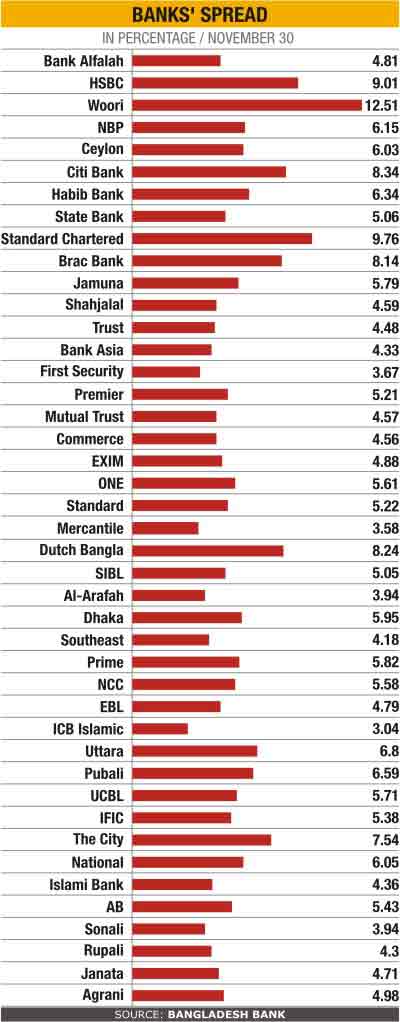BB moves to bring transparency to banks' interest rates

Bangladesh Bank (BB) yesterday for the first time released data on interest-rate spread to increase competition among banks and help consumers get services at a lower cost.
The interest-rate spread is the difference between lending and deposit rates. An increase in the spread means the banks gave lower interest rates to depositors but charged higher rates from loan seekers.
The bank interest rate spread increased in 2011, compared to 2010, which is one of the reasons behind hefty profits that banks made last year, according to data from the central bank.
“The inclusion of the bank interest rate information on our website is part of the Bangladesh Bank Open Data Initiative whose aim is to promote easily downloadable access to economic and financial sector data,” said Hassan Zaman, senior economic adviser to the central bank governor.
“This sort of data dissemination can strengthen consumer awareness and hopefully promote healthy competition in the banking sector,” he said.
“The BB step is good but it is not sufficient,” former BB governor Salehuddin Ahmed said.
The spread should remain below 5 percent. If the spread of any bank is higher than that, the central bank must intervene, Ahmed added.
In the Bangladesh context, opening up everything in the name of free-market economy will not be proper, he said.
The spread of all banks increased 0.07 percentage point to 5.23 percent on average in November 2011, compared to December 2010, central bank data showed.
The interest rate spread of many banks was above 6 percent, according to data on individual banks. The spread of most foreign banks is much higher.
Zaman said the high interest spread can be justified for some banks because they have a larger share of SME lending, but there are certainly scopes for some other banks to reduce the spread.
The spread of state-owned commercial banks was much lower about one and a half years ago but it has started to increase now. But it is still below 5 percent.
A high official of Agrani Bank said the state banks compete with private banks. As a result, they are forced to increase the interest on deposit and lending.
In 2011, many thought that Bank profits will be much lower due to a fall in their profits from the share market, but in reality both the public sector and private banks made good profits. Most of the banks made more profit in 2011, compared to 2010.
In addition to the high spread, the Banks made good profits from the foreign exchange market, Ahmed said. The commission charged by the Banks is much higher now.
The Banks normally give less interest to the depositors and charge more in case of lending, he said. BB will have to continuously monitor the situation so that the Banks do not give lower interest rates to the depositors and charge more form the borrowers.
Many bank officials said the central bank withdrew the lending cap recently, which will increase the lending rate in 2012. In addition, to collect deposits, the banks will embark upon stiff competition, pushing the deposit rate up.
The managing director of a private bank said the government has taken an initiative to allow a number of new private banks to be set up, which will further increase competition.
The Daily Star/Bangladesh/ 13th Jan 2012
Other Posts
- Sonali Bank earns record Tk 15.04b profit in 2011
- Islami Bank donates Tk 30 lakh to CARES
- FSIBL, Global Money sign remittance deal
- HSBC appoints new COO
- One Bank, BB sign investment, financing deal
- Prime Bank's new additional MD
- New financial institutions head for Citi
- BB to open consumer protection cell Jan 19
- ADB's country head retires
- Aid aplenty, but delayed The country director of Asian Development Bank stresses the need to build capacity in project implementation with donor funds
- 1 Muhith hopes positive WB decision on Padma Bridge within this month
- Mafia now 'Italy's No.1 bank' as crisis bites
- Remittance inflow stands $250m in 1st week of January
- Foreign banks squeeze costs as Asia’s glow fades




Comments